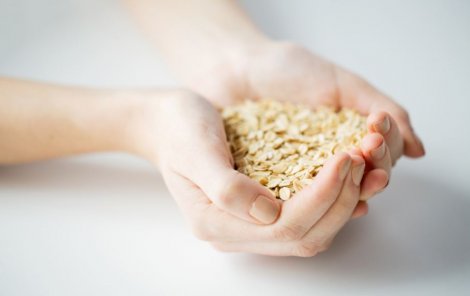Oats: Health Benefits for Athletes

The health benefits of oats make them a valued cereal for athletes. They’re perfect for including in the diet of anyone who exercises regularly. Many experts consider oats to be the preferred carbohydrate when preparing diet plans.
These days, not all athletes consume carbohydrates. The ketogenic diet is gaining more followers each year, and many decide to eliminate products containing carbohydrates and sugars from their diets.
However, for strength sports, it’s still recommended to have a steady dietary intake of carbohydrates. These have a two-fold function. On the one hand, they guarantee energy; and on the other hand, they help with recovery. In the following article, we’ll discuss why oats are one of the best cereals for athletes.
Health benefits of oats for athletes: complex carbohydrates
If you’re an athlete in strength sports, you’ll need carbohydrates in your diet, according to an investigation published in the magazine Journal of the International Society of Sports Nutrition. Consuming these nutrients after strenuous exercise improves your body’s recovery capabilities. It also helps to increase performance levels in future exercise sessions.
You probably already know it’s best to reduce the consumption of simple sugars, and that it’s best that any carbohydrates you consume are of the complex kind. Oats are a cereal rich in this type of nutrient. That means that oats are a great food for before, as well as for after, a training session.
While other foods such as pasta don’t provide sustained benefits, oats help to raise your glycemic index gradually and maintain it over time. That way, the risk of reactive hypoglycemia is reduced, where the person begins to feel hungry again just a short time after a meal.

Fiber is why oats have so many health benefits for athletes
The fiber in oats is soluble. It’s a substance that your intestines can’t digest, but that ferments when it’s passing through your digestive system. When this fermentation takes place, it causes a selective growth of the gut’s microbiota, making the microbiota increase in diversity. This bacteria is what your gut needs to digest food properly, according to a study published in The Journal of Nutritional Biochemistry.
Beta-glucans make up the main part of oat fiber. These nutrients contribute to improving the general state of your health and to reducing the risk of digestive problems. Consuming this type of fiber frequently increases an athlete’s metabolic flexibility when using energy substrates, and with it, their performance.
The concept of metabolic flexibility itself is associated with improved efficiency in the glucose-lactate cycle. This process, as an article in Sports Medicine affirms, is able to improve athletic performance.
Including oats in an athlete’s diet
As we’ve seen, the health benefits of eating oats for athletes are many and varied. To take advantage, we recommend you include this wholesome food in breakfasts, as well as before and after training sessions.
One of the advantages of oats is that they combine well with other ingredients. For instance, you can cook porridge or oatmeal, with water or milk. You can add cocoa, berries, or even banana to increase the nutritional value even more.

It’s also possible to prepare baked goods with oats. Using oats as a base, you can make cookies and even cakes that have health benefits for athletes. In any case, remember not to add sugar to these recipes, but rather healthier substitutes. If not, you’ll be reducing the overall benefits.
Oats, an important cereal
The health benefits of oats for athletes are indisputable. To obtain the benefits, however, it’s necessary to include this food regularly in your diet.
A regular intake of oats will contribute to an improvement in digestion thanks to an increase in the diversity of your gut microbiota, as we’ve mentioned above. This causes greater metabolic flexibility, and therefore, the body can use nutrients more efficiently.
The health benefits of oats make them a valued cereal for athletes. They’re perfect for including in the diet of anyone who exercises regularly. Many experts consider oats to be the preferred carbohydrate when preparing diet plans.
These days, not all athletes consume carbohydrates. The ketogenic diet is gaining more followers each year, and many decide to eliminate products containing carbohydrates and sugars from their diets.
However, for strength sports, it’s still recommended to have a steady dietary intake of carbohydrates. These have a two-fold function. On the one hand, they guarantee energy; and on the other hand, they help with recovery. In the following article, we’ll discuss why oats are one of the best cereals for athletes.
Health benefits of oats for athletes: complex carbohydrates
If you’re an athlete in strength sports, you’ll need carbohydrates in your diet, according to an investigation published in the magazine Journal of the International Society of Sports Nutrition. Consuming these nutrients after strenuous exercise improves your body’s recovery capabilities. It also helps to increase performance levels in future exercise sessions.
You probably already know it’s best to reduce the consumption of simple sugars, and that it’s best that any carbohydrates you consume are of the complex kind. Oats are a cereal rich in this type of nutrient. That means that oats are a great food for before, as well as for after, a training session.
While other foods such as pasta don’t provide sustained benefits, oats help to raise your glycemic index gradually and maintain it over time. That way, the risk of reactive hypoglycemia is reduced, where the person begins to feel hungry again just a short time after a meal.

Fiber is why oats have so many health benefits for athletes
The fiber in oats is soluble. It’s a substance that your intestines can’t digest, but that ferments when it’s passing through your digestive system. When this fermentation takes place, it causes a selective growth of the gut’s microbiota, making the microbiota increase in diversity. This bacteria is what your gut needs to digest food properly, according to a study published in The Journal of Nutritional Biochemistry.
Beta-glucans make up the main part of oat fiber. These nutrients contribute to improving the general state of your health and to reducing the risk of digestive problems. Consuming this type of fiber frequently increases an athlete’s metabolic flexibility when using energy substrates, and with it, their performance.
The concept of metabolic flexibility itself is associated with improved efficiency in the glucose-lactate cycle. This process, as an article in Sports Medicine affirms, is able to improve athletic performance.
Including oats in an athlete’s diet
As we’ve seen, the health benefits of eating oats for athletes are many and varied. To take advantage, we recommend you include this wholesome food in breakfasts, as well as before and after training sessions.
One of the advantages of oats is that they combine well with other ingredients. For instance, you can cook porridge or oatmeal, with water or milk. You can add cocoa, berries, or even banana to increase the nutritional value even more.

It’s also possible to prepare baked goods with oats. Using oats as a base, you can make cookies and even cakes that have health benefits for athletes. In any case, remember not to add sugar to these recipes, but rather healthier substitutes. If not, you’ll be reducing the overall benefits.
Oats, an important cereal
The health benefits of oats for athletes are indisputable. To obtain the benefits, however, it’s necessary to include this food regularly in your diet.
A regular intake of oats will contribute to an improvement in digestion thanks to an increase in the diversity of your gut microbiota, as we’ve mentioned above. This causes greater metabolic flexibility, and therefore, the body can use nutrients more efficiently.
All cited sources were thoroughly reviewed by our team to ensure their quality, reliability, currency, and validity. The bibliography of this article was considered reliable and of academic or scientific accuracy.
- Krachna Ranchordas M., Dawson JT., Russell M., Practical nutritional recovery strategies for elite soccer players when limited time separates repeated matches. J Int Soc Sports Nutr, 2017.
- Jayachandran M., Chen J., Man Chung SS., Xu B., A critical review on the impacts of b glucans on gut microbiota and human health. J Nutr Biochem, 2018. 61: 101-110.
- San Millán I., Brooks GA., Assessment of metabolic flexibility by means of measuring blood lactate, fat, and carbohydrate oxidation responses to exercise in professional endurance athletes and less fit individuals. Sports Med, 2018. 48 (2): 467-479.
This text is provided for informational purposes only and does not replace consultation with a professional. If in doubt, consult your specialist.








